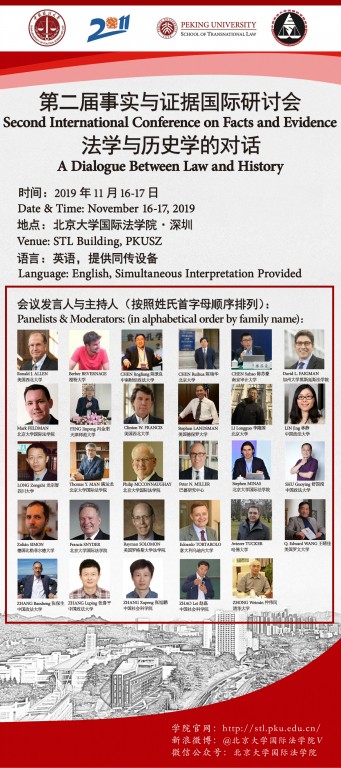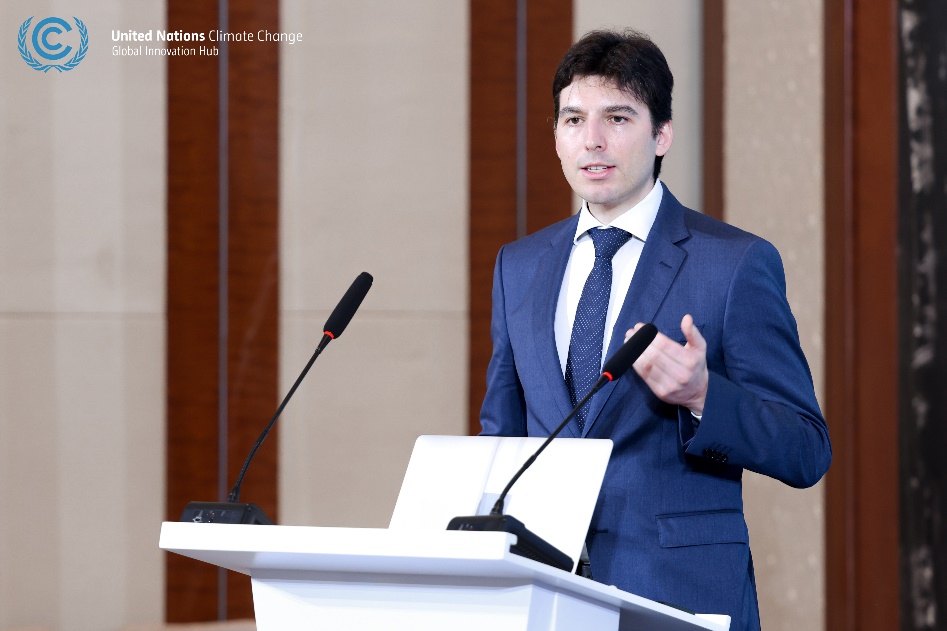Copyright © 2024 Peking University School of Transnational Law.

2019-11-13 Views: 79
On November 16-17, 2019, Peking University School of Transnational Law (STL) will host the Second “International Conference on Facts and Evidence – A Dialogue between Law and History”.
Co-sponsored by the “2011 Plan” – Collaboration Innovation Center of Judicial Civilization, STL, and the Institute of Evidence Law and Forensic Science of China University of Political Science and Law (Key Laboratory of Evidence Science, Ministry of Education), the conference builds on the success of the workshop held in STL in September 14-5 with the same theme and will feature more than 20 distinguished jurists and historians from around the world to explore issues relating to fact-finding in judicial process and historical research, including:
Facts as past events: a common theme in legal and historical studies
Facts and evidence in historical research
Evidentiary proof in the study of history
Facts and evidence in the judicial process
Evidence law as epistemology in judicial proof
Comparative study of the role of facts in law and history
The Steering Committee of the Conference is composed of ZHANG Baosheng, DuanSheng Chair Professor of Law, China University of Political Science of Law (Chairman), Thomas Y. MAN, Professor from Practice of STL (Co-Chairman), Ronald J. ALLEN, John Henry Wigmore Professor of Law, Northwestern University School of Law (Advisor – Law), Q. Edward WANG, Professor of History, Rowan College (Advisor – History).
A partial list of the speakers and affiliated institutions includes (in alphabetical order by family name):
Ronald J. ALLEN (Northwestern University, USA), Berber BEVERNAGE (Ghent University, Belgium), CHEN Ruihua (Peking University, China), CHEN Jingliang (South Central University of Finance and Law, China), David L. FAIGMAN (University of California Hastings School of Law, USA), FENG Jinpeng (Tianjin Normal University, China), Clinton W. FRANCIS (Northwestern University, USA), Stephan LANDSMAN (DePaul University, USA), LI Longguo (Peking University, China), LONG Zongzhi (Sichuan University, China), Thomas Y. MAN (Peking University School of Transnational Law, China), Peter N. MILLER (Bard Graduate Center, USA), SHU Guoying (China University of Pollical Science and Law, China), Zoltán SIMON (Bielefeld University, Germany), Rayman SOLOMON (Rutgers University School of Law, USA), Edoardo TORTAROLO (University Udine, Italy), Aviezer TUCKER(Harvard University, USA), Q. Edward WANG (Rowan College, USA), ZHANG Baosheng (China University of Pollical Science and Law, China), ZHANG Xupeng (Chinese Academy of Social Sciences, China), ZHONG Weimin (Tsinghua University, China).
Professor ZHANG Baosheng, Chairman of the Steering Committee, issued these welcome remarks on behalf of the conference:
“Facts, which are characterized by, among other features, truthfulness, experience and narratability, are the logical starting point of evidence law. Evidence, as information relating to facts, is used to prove the possibility of an asserted fact. Trials begin with the determination of facts. Accurate determination of facts is the pre-condition of correct application of law and judicial justice. Evidence provides the necessary condition for fact-determination and the sole “bridge” connecting the objective facts and the cognitive subjects. Evidence law is a legal discipline focusing on how to determine facts by evidence, but the study of facts, evidence and determination of facts is an interdisciplinary undertaking in which legal scholars wish to receive inspiration from scholars of history on their studies. In my opinion, history is a science of evidence, both history and law study the evidence inference of past facts, and their aim is to restore facts to the greatest extent possible. There are many differences between the object and method of the study of history and evidence law, which are worthy of reference to evidence law. This conference on “Facts and Evidence: A Dialogue between Law and History” will promote the in-depth interdisciplinary study of evidence science. We expect to see more interdisciplinary dialogues between law and other fields, such as psychology and law, linguistics and law, logic and law, etc. We cordially extend invitation to fellow scholars in related disciplines. We look forward to your contributions and seeing you in Shenzhen!”


October 14, 2024
October 14, 2024
October 14, 2024
October 14, 2024
October 14, 2024